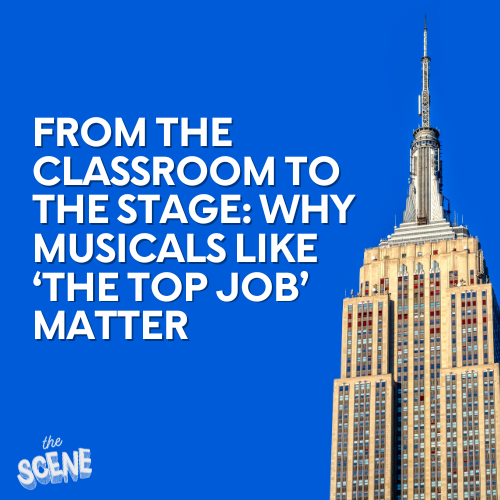As we bring down the final curtain on 2024, we begin with a heartfelt thank you. It’s your curiosity, your passion, and your willingness to engage that have propelled The Scene’s newsletter forward this year. With every click and conversation, you’ve helped transform these pages from mere information into a thriving exchange of ideas. Together, we ventured beyond the familiar glow of the footlights, slipping into classrooms, rehearsal halls, and the cultural currents that swirl through our work. Your thoughtful presence allowed us not only to share stories but to shape them, and for that, we’re deeply grateful.
Today, we present our top ten of 2024—ten articles on the opportunities, hiccups, breakthroughs, and heartbreaks that defined this year in theatre and theatre education. Collectively, they capture the swing and swagger of a year that wasn’t afraid to ask tough questions and demand honest answers. They shine a light on where we’ve been, where we’re headed, and the vital role we all play—on stage, in the classroom, in our neighborhoods—in making theater not just an art form but a living, breathing conversation.
So, settle in. There’s an encore on its way, and these ten articles are your front-row ticket to the lessons we learned, the dialogues we sparked, and the inspiration we’ll carry into 2025 and beyond.
- Directing Comedy: Tips for High School Theatre Directors I learned from TV’s James Burrows.- Directing high school theatre can feel like a Herculean task, especially when it comes to directing comedy. Guiding seasoned actors in delivering punchlines with finesse is one thing, but getting a group of teenagers to understand comedic timing and the truth behind the humor is a whole different challenge. Yet, if one person has mastered the art of transforming scripts into genuine laughter, it’s the legendary television director James Burrows. For those who may not know, Burrows is the creative mastermind behind some of the most iconic TV shows ever, including Taxi, Cheers, Frasier, Friends, Will & Grace, and many more. He’s a Yale School of Drama graduate and the son of Abe Burrows, the celebrated librettist behind ‘Guys and Dolls’ and ‘How to Succeed in Business Without Really Trying.’ Continue Reading…
- Setting the Stage for Success: Tips for Conducting Stellar Auditions- Audition days. For high school theatre teachers, it’s part thrill, part chaos, and part existential crisis. Here’s the good news: with a bit of planning, a splash of patience, and some problem-solving know-how, you can turn auditions into a process that’s not only smooth but inspiring. This is your chance to nurture young talent, create excitement, and lay the foundation for a production that’s as rewarding for your students as it is for you. Continue Reading…
- When the Drama’s Offstage? How to Get Your Production Back on Track- You’ve cast the show, you’ve got your scripts, and the stage is set—literally. The curtain is weeks away from rising, and yet, there’s a growing knot in your stomach. The cast is missing lines, the crew is missing cues, and at least one student is missing from rehearsal altogether. High school theater directors, I see you. But don’t worry! This is not the part where I tell you to start panicking. In fact, it’s quite the opposite. Whether you’re facing forgotten lines, backstage chatter, or outright mutiny (okay, maybe it’s just a little teen drama), here’s a roadmap to help overcome some of the most common production challenges high school theatre directors face. Continue Reading…
- The Power of the Vignette Play: How Shows like ‘Almost, Maine;’ ‘Late Bus,’ and More are a Theatre Educator’s Secret Weapon- We’re approaching summer, which means theatre teachers everywhere are looking forward to some time to relax and some time to find new plays to bring back to school. There are some plays that theatre teachers come back to time and time again, whether that’s in the classroom or in a full production. ‘Almost, Maine’ has remained one of the most-produced titles in North American high schools for over a decade now, topping this list for the majority of that time. What is the key to its popularity and success? Look no further than the power of the vignette. Continue Reading…
- Theatre’s Role in Addressing the Youth Mental Health Crisis- The mental health crisis among teens and young adults has been escalating, fueled by factors like social isolation, economic uncertainties, and the pressures of digital life. Amidst this backdrop, innovative solutions are being sought to provide relief and support, and one surprising but potent therapy is theatre. With its unique blend of creativity, collaboration, and expression, theatre stands out as a compelling method for alleviating anxiety and depression. Here, we explore how engaging in theatre—as an audience member or participant—can offer significant mental health benefits for teens and young adults. Continue Reading…
- How Theatre Can Help Us Succeed at Work- Ever thought your day job could probably benefit from a dash of Broadway magic? It’s not as far-fetched as it sounds. Theatre isn’t just an art form; it’s a masterclass in life skills that spill over into our professional lives. The cast and crew of a production, a mosaic of personalities, talents, and idiosyncrasies, provides a unique lens through which anyone working in any profession can glean valuable insights. Here’s how theatre can supercharge your professional skills and transform your work environment into a stage for success. Continue Reading…
- The Fascinating World of Theatre Superstitions- The world of theater is a realm where creativity, artistry, and superstition intermingle. Behind the glitz and glamour of the stage lies a rich tapestry of traditions and beliefs that have been passed down through generations of performers, directors, and stagehands. These theater superstitions add an air of mystery and intrigue to an already captivating world. Join us as we explore the meaning and origins behind ten intriguing theater superstitions. Continue Reading…
- Increasing Parent Involvement in Your Theatre Program – Theatre programs in educational settings offer students unparalleled opportunities to explore creativity, develop empathy, and hone their communication skills. However, the success of these programs often hinges not just on the dedication of students and educators but also on the involvement of parents. Engaging parents can provide additional support, resources, and enthusiasm, enhancing the overall experience for everyone involved. Here are strategies to increase parent involvement in your theatre program, fostering a more vibrant and supportive community. Continue Reading…
- Fostering Emotional Intelligence Through Theatre – In today’s fast-paced world, emotional intelligence plays a crucial role in personal growth and success. It goes beyond book smarts or academic achievements; it encompasses understanding our own emotions as well as empathizing with others. And what better way to cultivate these essential skills than through the magic of theatre? Continue Reading…
- Censorship in Theatre Education: Navigating the Tightrope of Artistic Expression – In the vibrant world of theatre education, where creativity and expression should reign supreme, a shadow looms large: the challenge of censorship. It’s a tightrope walk for educators, balancing the need for artistic freedom with the constraints imposed by various stakeholders. The question, “Who decides what teachers can teach?” opens a Pandora’s box of debates, policies, and ethical considerations. Continue Reading…









